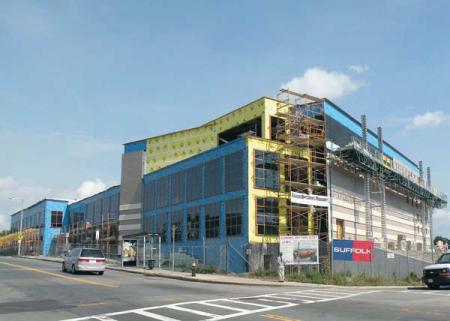August 2, 2012
 Kroc Center on Dudley Street: Shown while still under construction in 2010.
Kroc Center on Dudley Street: Shown while still under construction in 2010.
A report released last month by the Dudley Street Neighborhood Initiative (DSNI) details the best practices for maximizing resident, minority and female participation in local construction projects and holds up the huge Salvation Army Kroc community center as a success story.
The July 11th report, entitled “For the People, By the People”, hopes to help combat continued high neighborhood unemployment rate by funneling local workers into the large number of pending development projects planned for Roxbury and Dorchester.
DSNI, founded in 1984, is a non-profit community-based planning and organizing group that focuses on community and economic development, leadership and collaboration, and youth opportunities and development. The report used the experiences of DSNI and neighborhood partners during the construction of the Salvation Army Ray and Joan Kroc Community Center as a case study. DSNI leaders played a key role in winning a competitive bid process to bring the community center to Dorchester. The non-profit was also a key player in the planning process for the formation of the center, which started in 2005. The facility’s doors were officially opened in March 2011.
“The motivation behind [the report] was to get the city’s collective voice that has been working on these issues for so many years on paper so the lessons we learned could be shared with others and so they could start off their projects from a more successful starting point,” said Travis Watson, a community organizer and planner at DSNI.
The report details the breakdown of the workforce for the Kroc Community Center project as well as strategies for providing construction opportunities to minority- and women-owned business enterprises. It also pointers on how to best monitor projects to make sure developers are meeting agreed-upon standards.
Watson sees the report as a “working document,” hoping that additions will be made to the document in future construction projects.
“The Kroc Center booklet helps paint a picture and a possible way that it could get done,” Watson said.
Historically, construction jobs in the city of Boston have been dominated by a predominantly white male workforce, Travis said, with many out-of-state workers included on jobs in the neighborhoods.
“It’s especially troubling in these touch economic times when folks are struggling to try to make ends meet,” Watson said.
The workforce target breakdown for the Kroc Center construction was based on standards outlined by the Roxbury Strategic Master Plan, which called for Fifty-one percent of the workers to be Boston residents, 51 percent people of color, and eight percent women. The final workforce numbers for the Kroc project were 45 percent Boston residents, 44 percent people of color and eight percent women. DSNI and the Kroc Center’s sponsors, the Salvation Army, also agreed that 85 percent of the full-time employees hired to staff the completed center would live within one mile of the center’s doors.
As the report details, a Kroc Workforce Committee was also formed in Jan. 2007, when people with development experience recommended DSNI meet with interested parties to explore what would be needed to ensure the ambitious workforce goals. The committee was made up of about 20 members, including residents, elected officials and local organization officials dedicated to workers’ rights.
Now, Watson said, a new story can be told as the breakdown of the workforce that built it will be part of the Kroc Community Center’s history.
“The actual center is very beautiful,” Watson said. “But I don’t want that to be the only story told when talking about the community center.”
“Our efforts have helped set the bar for future construction within the City of Boston and show that the targets set by the Roxbury Strategic Master Plan are within reach,” DSNI Executive Director John Barros said in a statement. “We no longer have to be satisfied with high levels of unemployment for residents, minorities, women, and minority- and women-owned businesses on construction projects.”
For more information about the DSNI report, or to get your own copy, contact Watson directly at twatson@dsni.org or call the DSNI headquarters at 617-442-9670. Copies are also available at the DSNI headquarters at 504 Dudley Street in Roxbury.



